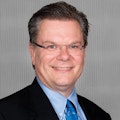The 2021 award-winning Sterile Processing team at Dover, DE-based Bayhealth may be the certified experts at device cleaning, high-level disinfection and sterilization within their multi-facility organization, but their contributions extend well beyond the confines of SPD.
SPD Director Melissa McVaugh shares more than a dozen examples of how her team demonstrated system-oriented strategies and tactics throughout a pandemic-stricken year.
SPD visited all the ambulatory practices and provided site-specific training to all instrument and endoscope end users, according to McVaugh. The staff were educated on “Point-of-Use” care and how to properly transport instruments from procedure room to soiled room. For a number of practices, SPD was able to convert them to the use of all disposable instruments.
SPD also assumed responsibility for the high-level disinfection of Speech Language Pathology endoscopes, she continues. “We are in the process of creating a Centralized Scope Processing initiative where all scopes, excluding GI/endoscopy, will be processed in SPD,” McVaugh told Healthcare Purchasing News. “In [fiscal year 2022] we will be exploring developing the business plan for central scope reprocessing. This will help with justification. This will lay the roadmap.”
SPD redeployed its instrument tracking system, SPM Surgical Asset Tracking Software from STERIS, after they found gaps in data, use and standards after implementing it initially in 2019. With new leadership in place by the end of that year, the redeployment resulted in the ability to track trends, productivity and metrics that weren’t accessible before, she indicates.
SPD implemented what it calls a “QA All Day” program within the department for measuring internal quality assessment (QA). “Each employee has [his or her] trays, after assembly, QA’d by another staff member,” she noted. “This is to prevent any errors reaching the OR and to improve on the Functional Accurate and Neat (FAN) concept.” Winners can earn a “Shining Star of the Month” award.
In the area of communication/relationships, SPD implemented daily rounding in the OR, a vendor accountability process and a departmental communication board.
For defect prevention, SPD implemented sterilization maintenance covers on all blue-wrapped instruments and QA on trays prior to being autoclaved as well as streamlined the loaner tray drop-off process.
SPD also implemented a new process for its One Tray System to expedite turnaround time for the OR.
In the area of employee safety, SPD weighs instruments sets to comply with AAMI ST79 standards. This remains a work-in-progress, McVaugh admits, as some trays still exceed standard weight limits.
SPD removed “clean/soiled” metal plates case carts, which can harbor moisture under the plate that can result in mold spores.
SPD also removed cabinet doors in favor of open shelving in the supply rooms for better organization. They installed a hanging shoe rack on the end cap of the shelving unit in the Pick room to make organized use of otherwise “wasted” space, according to McVaugh. They removed unneeded OR instrument sets, too.
To prevent excess reprocessing, SPD implemented the use of sterility maintenance covers on all sets, including metal containers, when being transferred between facilities.
They affixed clean/soiled hang tags on case carts and switched to blue tags to identify instruments in need of One Tray from the OR. The blue color replaced the red tag, which was being misinterpreted in several ways, she adds.
During the pandemic, SPD staff also were “willing and ready” to be deployed to other areas of the hospital where COVID-19 response assistance was needed, according to McVaugh. Relying on equipment IFUs from STERIS and Advanced Sterilization Products (ASP) and Centers for Disease Control and Prevention (CDC) guidelines, SPD developed a process for reprocessing N95 masks safely to extend their use by front-line workers, she notes.
Surprisingly, the pandemic didn’t sideline or slow momentum, according to McVaugh.
“We did have the usual suspected COVID outages for staffing, but other than that, we just kept going forward,” she said. “It really had no bearing on our progress.”
In ranking among SPD’s project difficulties, McVaugh lists the metal plates on case carts as the easiest to tackle. “No one was invested in it, and [they] understood the rationale,” she said. [It was] easy because it was visible and non-political.”
The hardest? Point-of-Use education. “We had to start from the fundamentals,” McVaugh recalled. “[Brian, our educator and I] went to an all-OR staff meeting to tell the story and relate that back to their own OR experience. That was the hardest because we were adding to their workflow, but we have made huge strides in this area.”
About the Author
Rick Dana Barlow
Senior Editor
Rick Dana Barlow is Senior Editor for Healthcare Purchasing News, an Endeavor Business Media publication. He can be reached at [email protected].

